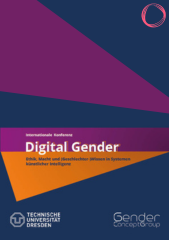'More Than Just Breakfast in Bed'
Objectification vs. Posthuman Collective Responsibility in Channel 4's "Humans"
DOI:
https://doi.org/10.17169/ogj.2024.216Keywords:
Artificial Intelligence, Feminization, "Humans", Mother Image, sexual violenceAbstract
In the intro to the Channel 4 television series "Humans" (2015-2018), a voice-over praises a gynoid with the words: "This mechanical housemaid can do more than just bring breakfast in bed". According to the argument of this article, the intro and beginning of the series activate misogynistic tendencies in the AI imagination in order to make them visible and question them. "Humans" illustrates how sexist and, less prominently, racist power structures are perpetuated in AI design. In particular, the series takes a critical look at the interaction between the objectification of women and the feminization of objects. Over the course of the three seasons, demands for overall social care and interspecific tolerance increasingly come to the fore. Ultimately, however, this tolerance is demanded solely on the basis of equivalence. At the same time, the series remains rooted in a binary gender construction. As a result, it partly undermines its own critique.
References
Atanasoski, Neda/Vora, Kalindi (2019a): Epilogue. On Technoliberal Desire, Or, Why There Is No Such Thing as a Feminist AI. In: Atanasoski, Neda/Vora, Kalindi (Hg.): Surrogate Humanity. Race, Robots, and the Politics of Technological Futures, Perverse Modernities. Durham: Duke University Press, 188–196. doi: 10.1515/9781478004455-009
Atanasoski, Neda/Vora, Kalindi (2019b): Introduction. In: Atanasoski, Neda/Vora, Kalindi (Hg.): Surrogate Humanity. Race, Robots, and the Politics of Technological Futures, Perverse Modernities. Durham: Duke University Press, 1–26. doi: 10.1515/9781478004455-002
Belk, Russell (2022): Artificial Emotions and Love and Sex Doll Service Workers. In: Journal of Service Research 25 (4), 1–16. doi: 10.1177/10946705211063692
Benedikter, Roland/Gruber, Mirjam (2019): The Technological Retro-Revolution of Gender. In a Rising Post-Human and Post-Western World, It Is Time to Rediscuss the Politics of the Female Body. In: Loh, Janina/Coeckelbergh, Mark (Hg.): Feminist Philosophy of Technology, TTechno:Phil. Aktuelle Herausforderungen der Technikphilosophie. Berlin: J.B. Metzler. doi: 10.1007/978-3-476-04967-4_10
Braidotti, Rosi (2014): Posthumanismus. Leben jenseits des Menschen. Frankfurt am Main/New York: Campus Verlag.
Compes, Natascha (2018): Doing Gender – Doing Human. In: denkste: puppe – multidisziplinäre zeitschrift für mensch-puppen-diskurse 1 (1), 92–101. urn: https://nbn-resolving.org/urn:nbn:de:hbz:467-13212
DeFalco, Amelia (2020): Towards a Theory of Posthuman Care. Real Humans and Caring Robots. In: Body & Society 26 (3), 31–60. doi: 10.1177/1357034X20917450
Docherty, Thomas (2016): Complicity. Criticism Between Collaboration and Commitment. London/New York: Rowman & Littlefield International.
Engel, Uwe (Hg.) (2023): Robots in Care and Everyday Life. Future, Ethics, Social Acceptance. 2023. Cham: Springer Nature. doi: 10.1007/978-3-031-11447-2
Featherstone, Jane/Wax, Derek/Lundström, Lars (Produzent*innen) (2015–2018): Humans [Fernsehserie]. Channel 4, Xbox Entertainment Studios, AMC; Channel 4.
Fraser, Nancy (2016): Contradictions of Capital and Care. In: New Left Review (100), 99–117.
Freitag, Charlotte/Berners-Lee, Mike/Widdicks, Kelly/Knowles, Bran/Blair, Gordon S./Friday, Adrian (2021): The Real Climate and Transformative Impact of ICT. A Critique of Estimates, Trends, and Regulations. In: Patterns 2 (9). doi: 10.1016/j.patter.2021.100340
Garland, Alex (Regie/Drehbuch) (2014): Ex Machina [Film] A24, Universal Pictures.
Haraway, Donna Jeanne (2018): Unruhig bleiben. Die Verwandtschaft der Arten im Chthuluzän. Frankfurt am Main/New York: Campus Verlag.
Haraway, Donna Jeanne (2006): A Cyborg Manifesto. Science, Technology, and Socialist-Feminism in the Late 20th Century. In: Weiss, Joel/Nolan, Jason/Hunsinger, Jeremy/Trifonas, Peter (Hg.): International Handbook of Virtual Learning Environments. Dordrecht: Springer, 117–158. doi: 10.1007/978-1-4020-3803-7_4
Harper, Susan/Smartt Gullion, Jessica (2021): “Science Put Babies in My Belly”. Cyborg Mothering and Posthumanism in Orphan Black. In: Palko, Abigail L./O’Reilly, Andrea (Hg.): Monstrous Mothers: Troubling Tropes. Bradford, Ontario: Demeter Press, 46–61. doi: 10.2307/j.ctv1vbd22k.7
Hellstrand, Ingvil Førland/Koistinen, Aino-Kaisa/Orning, Sara Elisabeth Sellevold (2019): Real Humans? Affective Imaginaries of the Human and its Others in Swedish TV series Äkta Människor. In: Nordic Journal of Migration Research 9 (4), 515-532. doi: 10.2478/njmr-2019-0028
Islam, Najrin (2020): Her. In: Murguía, Salvador Jimenez/Dymond, Erica Joan/Fennelly, Kristina (Hg.): The Encyclopedia of Sexism in American Films, National Cinema Series. Lanham, Maryland: Rowman & Littlefield, 169–172.
Jonze, Spike (Regie, Drehbuch) (2013): Her [Film]. Annapurna Pictures.
Kurtz, Katherine (2020): Monster-as-Actor, Woman as Role. In: Compagna, Diego/Steinhart, Stefanie (Hg.): Monsters, Monstrosities, and the Monstrous in Culture and Society. Wilmington: Vernon Press, 27–48.
Langer, Paul F./Weyerer, Jan C. (2020): Diskriminierungen und Verzerrungen durch Künstliche Intelligenz. Entstehung und Wirkung im gesellschaftlichen Kontext. In: Oswald, Michael/Borucki, Isabelle (Hg.): Demokratietheorie im Zeitalter der Frühdigitalisierung. Wiesbaden: Springer VS, 219–240. doi: 10.1007/978-3-658-30997-8_11
Lundström, Lars (Produzent) Hamrell, Harald/Akin, Levan (Regie) (2012): Real Humans [Fernsehserie]. Sveriges Television.
O’Reilly, Andrea (2004): Introduction. In: O’Reilly, Andrea (Hg.): Mother Outlaws. Theories and Practices of Empowered Mothering. Toronto: Women’s Press, 1–28.
Rose, Jacqueline (2018): Mothers. An Essay on Love and Cruelty. [First American Edition]. New York: Farrar, Straus and Giroux. doi: 10.3366/pah.2019.0285
Sanders, Mark (2002): Complicities. The Intellectual and Apartheid. Philosophy and Postcoloniality. Durham: Duke University Press. doi: 10.1215/9780822384229
Simpson, Ruth/Slutskaya, Natasha/Lewis, Patricia/Höpfl, Heather (2012): Introducing Dirty Work, Concepts and Identities. In: Simpson, Ruth/Slutskaya, Natasha/Lewis, Patricia/Höpfl, Heather (Hg.): Dirty Work. Concepts and Identities, Identity Studies in the Social Sciences. Houndmills /New York: Palgrave Macmillan, 1–18. doi: 10.1057/9780230393530_1
Stadler, Jane (2017): Empathy in Film. In: Maibom, Heidi Lene (Hg.): The Routledge Handbook of Philosophy of Empathy, Routledge Handbooks in Philosophy. London/New York: Routledge, Taylor & Francis Group, 317–326. doi: 10.4324/9781315282015
Thürmer-Rohr, Christina (2008): Mittäterschaft von Frauen. Die Komplizenschaft mit der Unterdrückung. In: Becker, Ruth/Kortendiek, Beate/Budrich, Barbara (Hg.): Handbuch Frauen- und Geschlechterforschung, Geschlecht & Gesellschaft. Wiesbaden: VS Verlag für Sozialwissenschaften, 88–93. doi: 10.1007/978-3-531-91972-0_11
Tronto, Joan C. (2013): Caring Democracy. Markets, Equality, and Justice. New York: New York University Press. doi: 10.18574/nyu/9780814770450.001.0001
Wächter, Cornelia (2022): ‘Skin in the Game’. Complicity and Queer Utopianism – Coils of the Serpent. In: Coils of the Serpent (10), 153–169.
Yang, Julianne Q.M. (2018): Negotiating Privilege and Social inequality in an Alternative Sweden. Real Humans/Äkta Människor (SVT, 2012–2013). In: Journal of Aesthetics & Culture 10 (2), 1438730. doi: 10.1080/20004214.2018.1438730

Downloads
Published
How to Cite
Issue
Section
Categories
License
Copyright (c) 2024 Cornelia Wächter

This work is licensed under a Creative Commons Attribution 4.0 International License.
All contributions in Open Gender Journal are published under the Creative Commons Attribution 4.0 International license. You may freely make use of the corresponding texts in accordance to the conditions of the license (License contract, generally understandable version). There is no exclusive transfer of usage rights ("copyright transfer"). Open Gender Journal does not charge authors any costs for publication (so-called Article Processing Charges, APC) or submission (so-called Submission Charges). Authors are encouraged to share their contributions in other places, such as repositories.













